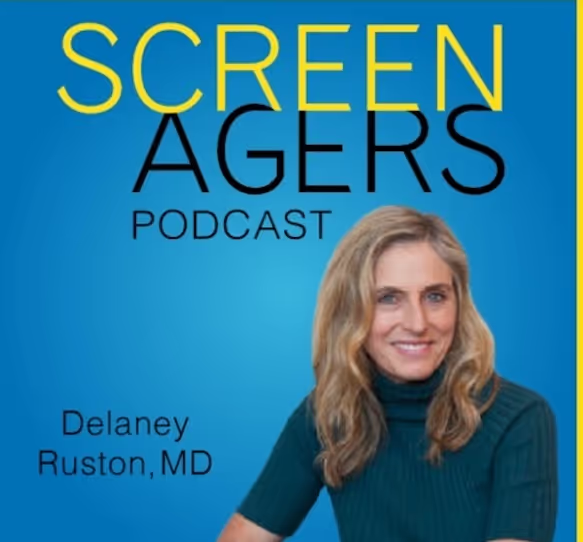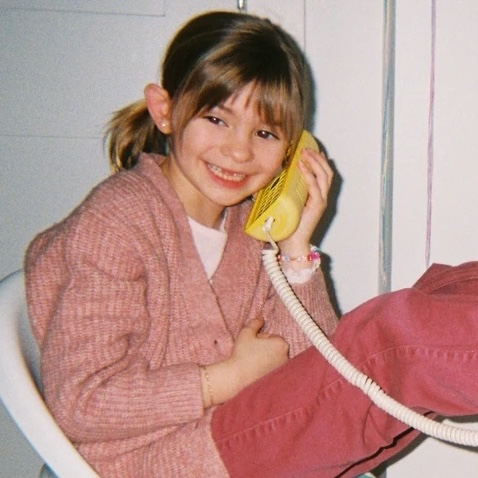


Today I’m super jazzed to announce the official launch of the Screenagers Podcast! I have the first two episodes here for you, one about TikTok and one about video gaming. This show is for parents, teachers, and other adults — but created to listen with kids and teens to spark constructive dialogue. Those of you who have been with me on this Tech Talk Tuesdays journey for almost five years will know that promoting conversations is my main jam, and the Screenagers Podcast show aligns with that passion.
I really hope you will subscribe. Thank you!
The Screenagers Podcast: Join Delaney Ruston, MD, a leading authority on parenting in the digital age and the filmmaker of the award-winning Screenagers movies, as she explores strategies for raising screen-wise and tech-balanced youth. Through interviews with researchers, thought leaders, and young people themselves, the Screenagers Podcast delivers the latest in science along with practical tips and important insights that parents will want to share with their kids and teens.
Episode 1: TikTok’s Allure and How Two Teens Cut Back
Time on TikTok has been skyrocketing. Why is it attracting such huge numbers of teens? What positives can happen on the app, and what are some of the risks? The sheer amount of time it consumes is what most young people say is TikTok’s biggest downside. On today’s show, Dr. Delaney Ruston speaks with two teenagers, Marie and Manisha, who answer these questions and others. Delaney puts on her metaphorical doctor’s coat when both girls share that they want to change their behavior on TikTok. Delaney helps them decide a plan of action, and then we flash forward to hear how they did with their goals.
Episode 2: Brain Biology and Preventing Excessive Video Gaming
Why do some kids and teens get overly frustrated and bored when it’s time to turn off their video games? How to know when game playing has become excessive? What are tips that all families should know for ensuring healthy videogame play? In today’s episode, Physician Delaney Ruston explores these issues along with a new model of brain biology to help explain irritability and boredom associated with video gaming. We hear from teens along with psychiatrist Dr. Clifford Sussman, who specializes in helping young people regain tech balance. We also hear from Andrew Fulton, who was in the film Screenagers when he was getting treatment at an internet rehab center, and is now working at the same center helping others recover from videogame overuse.
Go here or anywhere you listen to your podcasts to download Screenagers Podcast.


We NOW have a way for people to host online events during this time. We still strongly believe in the coming together as a group model for showing both movies, so these temporary online events will be here only while the social distancing is in place.
Click here if you are interested in hosting an ONLINE screening for your community.
Click here if you want to attend an ONLINE screening.
Learn more about showing our movies in your school or community!
Join Screenagers filmmaker Delaney Ruston MD for our latest Podcast

Learn more about our Screen-Free Sleep campaign at the website!
Our movie made for parents and educators of younger kids
Learn more about showing our movies in your school or community!
Learn more about showing our movies in your school or community!
Join Screenagers filmmaker Delaney Ruston MD for our latest Podcast

Learn more about our Screen-Free Sleep campaign at the website!
Our movie made for parents and educators of younger kids
Join Screenagers filmmaker Delaney Ruston MD for our latest Podcast
As we’re about to celebrate 10 years of Screenagers, we want to hear what’s been most helpful and what you’d like to see next.
Please click here to share your thoughts with us in our community survey. It only takes 5–10 minutes, and everyone who completes it will be entered to win one of five $50 Amazon vouchers.
Today I’m super jazzed to announce the official launch of the Screenagers Podcast! I have the first two episodes here for you, one about TikTok and one about video gaming. This show is for parents, teachers, and other adults — but created to listen with kids and teens to spark constructive dialogue. Those of you who have been with me on this Tech Talk Tuesdays journey for almost five years will know that promoting conversations is my main jam, and the Screenagers Podcast show aligns with that passion.
I really hope you will subscribe. Thank you!
The Screenagers Podcast: Join Delaney Ruston, MD, a leading authority on parenting in the digital age and the filmmaker of the award-winning Screenagers movies, as she explores strategies for raising screen-wise and tech-balanced youth. Through interviews with researchers, thought leaders, and young people themselves, the Screenagers Podcast delivers the latest in science along with practical tips and important insights that parents will want to share with their kids and teens.
Episode 1: TikTok’s Allure and How Two Teens Cut Back
Time on TikTok has been skyrocketing. Why is it attracting such huge numbers of teens? What positives can happen on the app, and what are some of the risks? The sheer amount of time it consumes is what most young people say is TikTok’s biggest downside. On today’s show, Dr. Delaney Ruston speaks with two teenagers, Marie and Manisha, who answer these questions and others. Delaney puts on her metaphorical doctor’s coat when both girls share that they want to change their behavior on TikTok. Delaney helps them decide a plan of action, and then we flash forward to hear how they did with their goals.
Episode 2: Brain Biology and Preventing Excessive Video Gaming
Why do some kids and teens get overly frustrated and bored when it’s time to turn off their video games? How to know when game playing has become excessive? What are tips that all families should know for ensuring healthy videogame play? In today’s episode, Physician Delaney Ruston explores these issues along with a new model of brain biology to help explain irritability and boredom associated with video gaming. We hear from teens along with psychiatrist Dr. Clifford Sussman, who specializes in helping young people regain tech balance. We also hear from Andrew Fulton, who was in the film Screenagers when he was getting treatment at an internet rehab center, and is now working at the same center helping others recover from videogame overuse.
Go here or anywhere you listen to your podcasts to download Screenagers Podcast.


We NOW have a way for people to host online events during this time. We still strongly believe in the coming together as a group model for showing both movies, so these temporary online events will be here only while the social distancing is in place.
Click here if you are interested in hosting an ONLINE screening for your community.
Click here if you want to attend an ONLINE screening.
Sign up here to receive the weekly Tech Talk Tuesdays newsletter from Screenagers filmmaker Delaney Ruston MD.
We respect your privacy.
Today I’m super jazzed to announce the official launch of the Screenagers Podcast! I have the first two episodes here for you, one about TikTok and one about video gaming. This show is for parents, teachers, and other adults — but created to listen with kids and teens to spark constructive dialogue. Those of you who have been with me on this Tech Talk Tuesdays journey for almost five years will know that promoting conversations is my main jam, and the Screenagers Podcast show aligns with that passion.
I really hope you will subscribe. Thank you!
The Screenagers Podcast: Join Delaney Ruston, MD, a leading authority on parenting in the digital age and the filmmaker of the award-winning Screenagers movies, as she explores strategies for raising screen-wise and tech-balanced youth. Through interviews with researchers, thought leaders, and young people themselves, the Screenagers Podcast delivers the latest in science along with practical tips and important insights that parents will want to share with their kids and teens.
Episode 1: TikTok’s Allure and How Two Teens Cut Back
Time on TikTok has been skyrocketing. Why is it attracting such huge numbers of teens? What positives can happen on the app, and what are some of the risks? The sheer amount of time it consumes is what most young people say is TikTok’s biggest downside. On today’s show, Dr. Delaney Ruston speaks with two teenagers, Marie and Manisha, who answer these questions and others. Delaney puts on her metaphorical doctor’s coat when both girls share that they want to change their behavior on TikTok. Delaney helps them decide a plan of action, and then we flash forward to hear how they did with their goals.
Episode 2: Brain Biology and Preventing Excessive Video Gaming
Why do some kids and teens get overly frustrated and bored when it’s time to turn off their video games? How to know when game playing has become excessive? What are tips that all families should know for ensuring healthy videogame play? In today’s episode, Physician Delaney Ruston explores these issues along with a new model of brain biology to help explain irritability and boredom associated with video gaming. We hear from teens along with psychiatrist Dr. Clifford Sussman, who specializes in helping young people regain tech balance. We also hear from Andrew Fulton, who was in the film Screenagers when he was getting treatment at an internet rehab center, and is now working at the same center helping others recover from videogame overuse.
Go here or anywhere you listen to your podcasts to download Screenagers Podcast.


We NOW have a way for people to host online events during this time. We still strongly believe in the coming together as a group model for showing both movies, so these temporary online events will be here only while the social distancing is in place.
Click here if you are interested in hosting an ONLINE screening for your community.
Click here if you want to attend an ONLINE screening.

Some families are exploring a new, Wi-Fi-enabled landline phone that allows kids to communicate without screens. This blog explains how the phone works, why parents value its simplicity and built-in controls, and how groups of families are adopting it together to reduce pressure around smartphones. A parent conversation highlights shared buy-in, voice-only communication, and giving kids more independence while delaying personal devices.
READ MORE >
Today I’m rounding up six of the most-read blogs from 2025 so far. Stories and interviews that struck a chord with readers and offered real tools for parenting in the screen age. Whether you missed a few or want a quick refresher, I hope you’ll find something here that inspires a new conversation in your home, school, or community.
READ MORE >for more like this, DR. DELANEY RUSTON'S NEW BOOK, PARENTING IN THE SCREEN AGE, IS THE DEFINITIVE GUIDE FOR TODAY’S PARENTS. WITH INSIGHTS ON SCREEN TIME FROM RESEARCHERS, INPUT FROM KIDS & TEENS, THIS BOOK IS PACKED WITH SOLUTIONS FOR HOW TO START AND SUSTAIN PRODUCTIVE FAMILY TALKS ABOUT TECHNOLOGY AND IT’S IMPACT ON OUR MENTAL WELLBEING.
